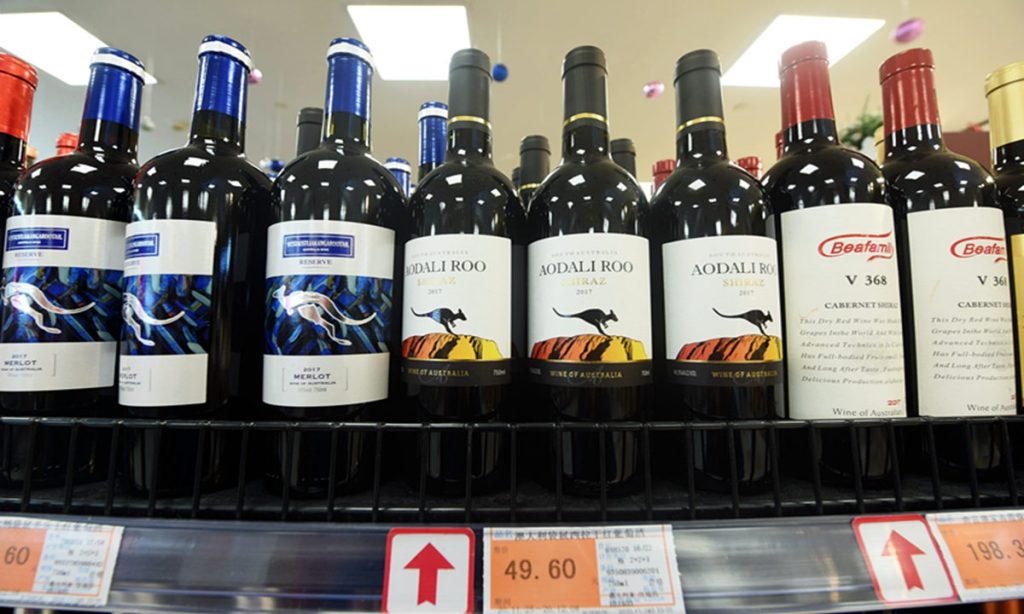China, Australia resolving trade issues through dialogue, consultation: FM

China and Australia are making efforts to address mutual concerns through dialogue and consultation, which will help improve the momentum in bilateral relations, Wang Wenbin, a spokesperson of China's Ministry of Foreign Affairs, said at a routine press conference on Wednesday.
Wang made the remarks in response to a media inquiry on whether the Chinese government is to lift tariffs on Australian wine. Recently, Australian officials and media outlets have claimed that China is prepared to remove the import tax.
"What I can tell you is that for some time, China and Australia have engaged in dialogue and consultation to address each other's concerns properly and jointly worked to realize a momentum of improvement and growth in the bilateral relations," Wang said.
"I'd refer you to competent authorities for your specific questions," the spokesperson said.
China stands ready to continue stepping up dialogue and cooperation with Australia under the principles of mutual respect, equality, mutual benefit and seeking common ground while shelving differences, so as to promote the steady and sound growth of China-Australia relations, Wang noted.
China and Australia are jointly addressing the wine dispute, with both sides approaching the matter with a candid and pragmatic attitude, Chen Hong, director of the Australian Studies Center of East China Normal University, told the Global Times on Wednesday.
The eagerness from the Australian side underscores the importance of the Chinese market as a major destination for the Australia's exports. Despite attempts by some players in the Australian wine industry to explore alternative markets, none can match the scale and growth speed of China, Chen said.
There is a strong anticipation that issues, including Australian lobster imports, could be resolved soon, as long as the Australian side avoids politicization of trade issues, Chen noted.
In 2019, Australian wine dominated China's market with a 35.54 percent share, surpassing France and securing the largest market share, according to media reports. However, this position was compromised following the deteriorating bilateral relations.
The previous market share of Australian wine in China was mostly taken over by wines from France, Chile and Italy.
The Chinese Ministry of Commerce (MOFCOM) began reviewing the anti-dumping and countervailing duties on Australian wine from November 30, 2023. The tariff on Australian wine was first levied on March 28, 2021.
Australian government officials and media outlets have frequently brought the issue up, indicating the great eagerness of Australian winemakers to return to the Chinese market.
Australian Trade Minister Don Farrell said on Sky News on Sunday that he was hopeful China would lift tariffs on Australian wine once a review is completed by the end of March, and progress is also being made on exporting lobsters to China, Reuters reported.
In a response to Farrell's statement, Chinese Ambassador to Australia Xiao Qian said at an event on Monday that China's review of tariffs on Australian wine is progressing well, but Xiao did not confirm that the dispute would be resolved this month, according to Reuters.
Treasury Wine Estates (TWE), an Australian global winemaker, said in a stock exchange filing on Tuesday that it has been advised that the MOFCOM has released an interim draft determination which proposes the removal of current tariffs China imposed on Australian wine imports.
The draft is not a final determination, TWE said, extending its anticipation that a final determination would be released in the coming weeks.
The frequent and active interactions of the Chinese and Australian officials also served as a crucial positive sign that more trade disputes would be resolved.
On February 26, Chinese Commerce Minister Wang Wentao met with Don Farrell, calling for strengthened cooperation in China's joining the Comprehensive and Progressive Agreement for Trans-Pacific Partnership. The meeting marked a new attempt to build closer bilateral trade ties.
Apart from resolving traditional trade disputes, Chen expressed his optimism that the China-Australia relationship has room for further advancement in much broader areas, highlighting the potential in burgeoning fields such as clean energy and the digital economy.
Additionally, Chen noted the importance of Australia adopting an open and sincere attitude toward Chinese investment, without succumbing to politically driven motivations influenced by the US over the so-called national security reasons. This open and sincere attitude is crucial for fostering a healthier and more sustainable future in bilateral relations, said Chen.